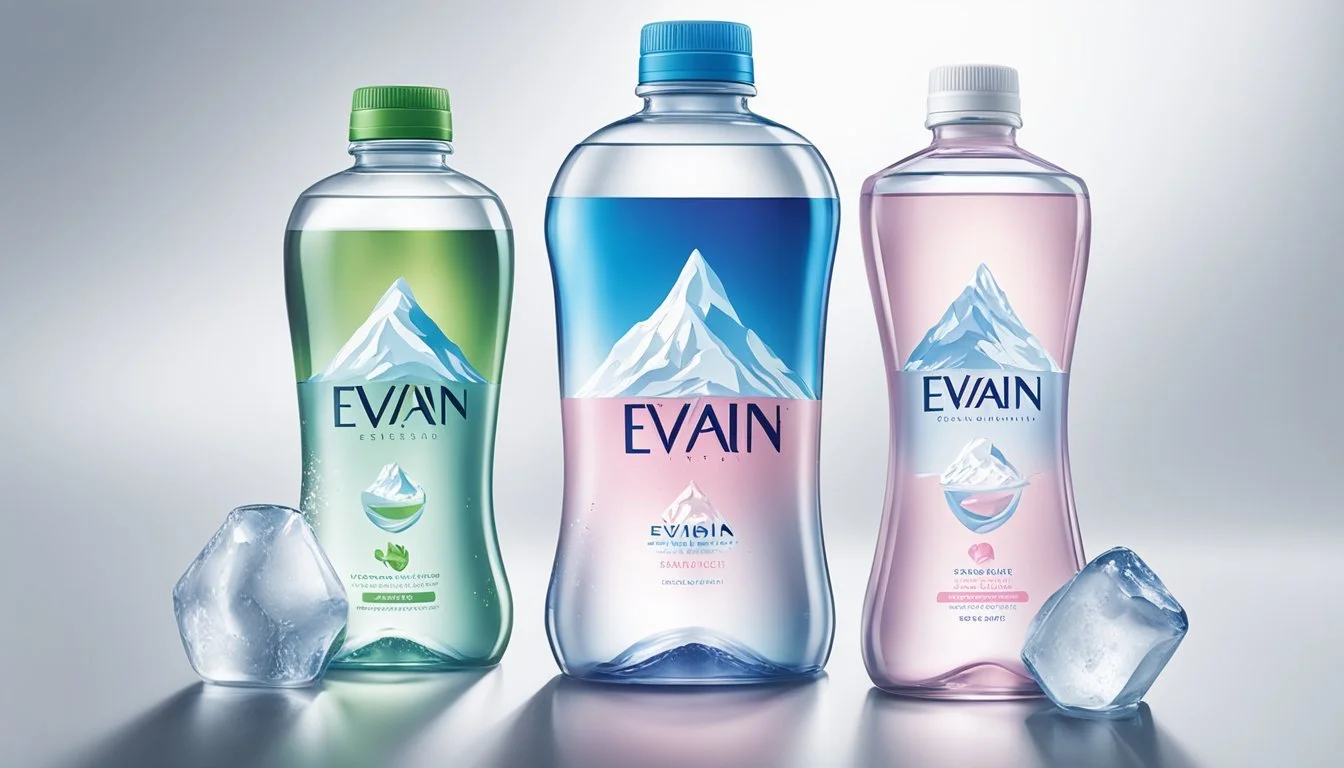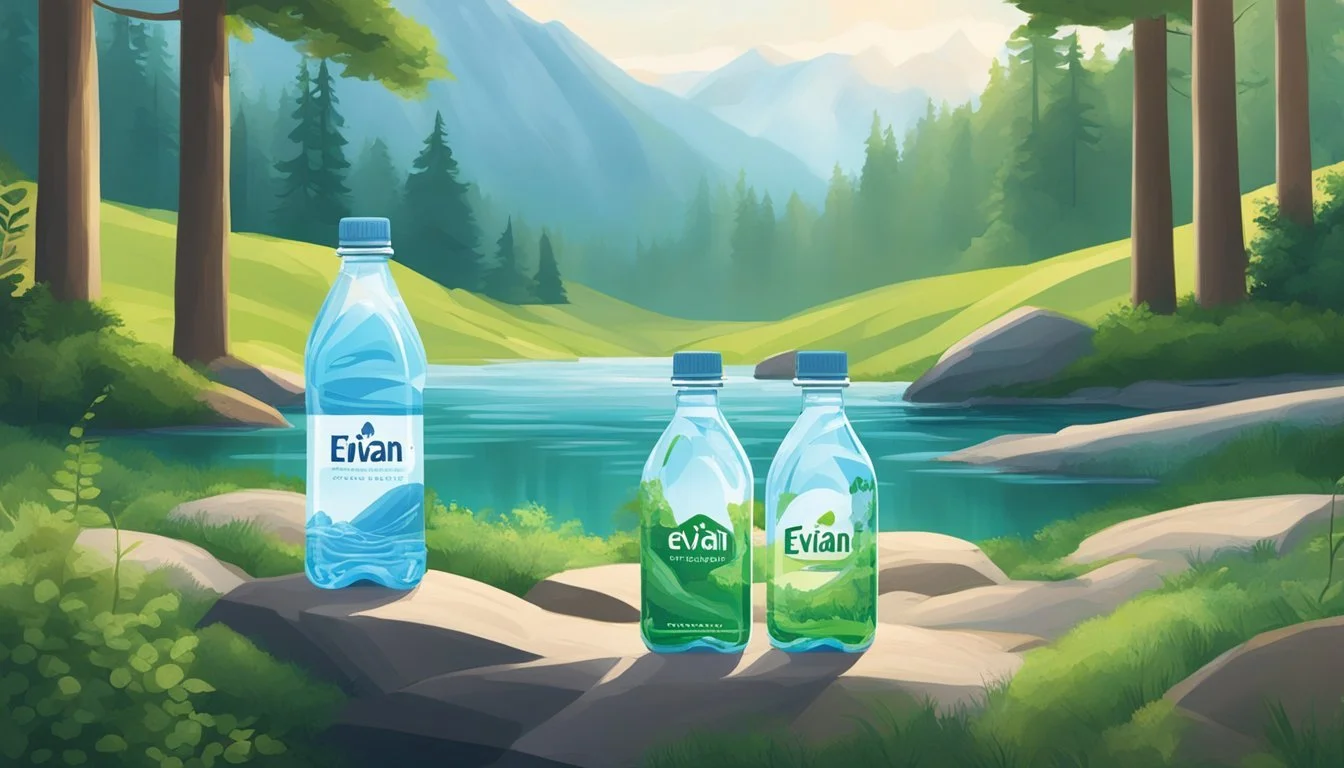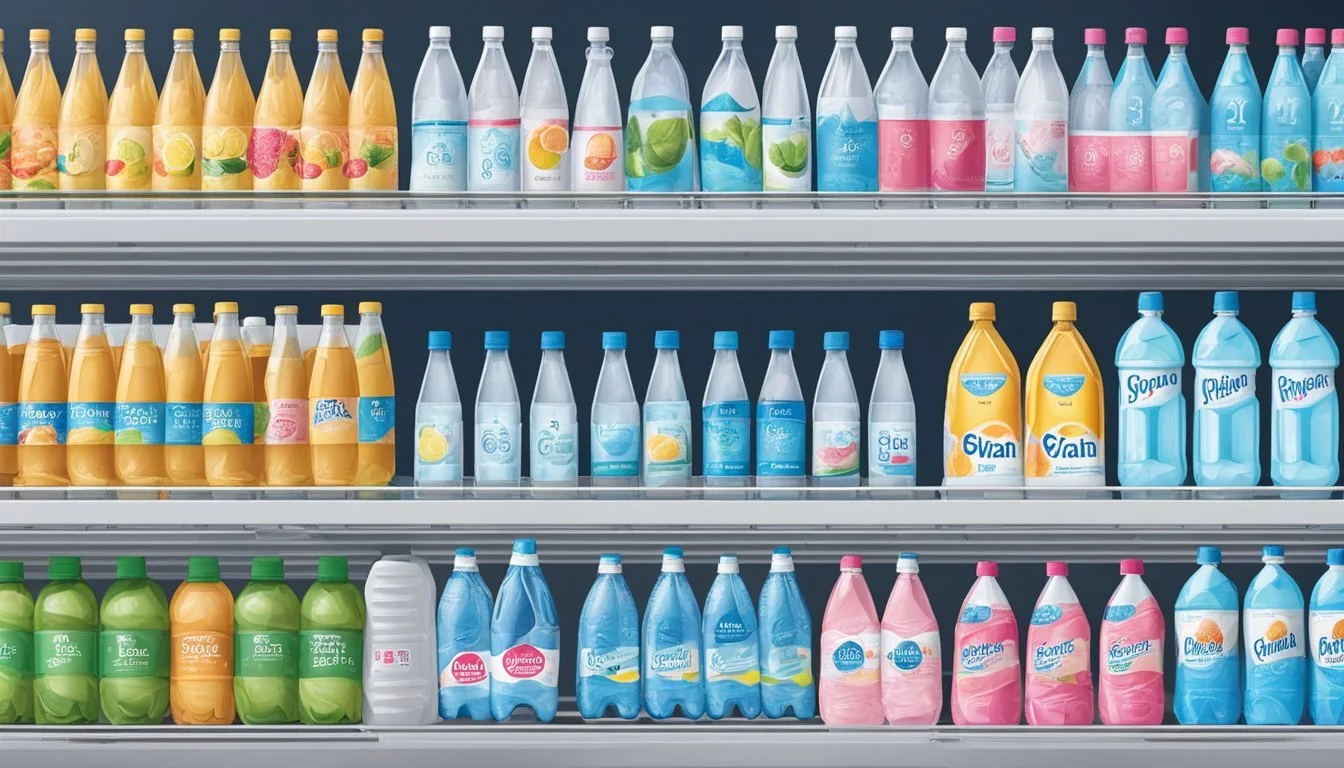Essentia vs. Evian
Comparing Taste, Purity, and Health Benefits
In the world of bottled water, Essentia and Evian stand out as two premium brands that promote quality and purity in their products. Essentia is renowned for its high pH water, boasting a level of 9.5, which it achieves through an ionization process that removes bitter-tasting acidic ions. This gives Essentia a smooth taste that many consumers find appealing. The brand also highlights its water's hydration capabilities, suggesting that its unique process enhances the body's absorption of water.
Evian, on the other hand, sources its water from the glacial runoff in the French Alps, naturally filtering it through layers of protected underground rock. The water gathers minerals and electrolytes during its journey, which contributes to its unique and desirable mineral content and taste profile. Unlike Essentia, Evian's selling point largely revolves around its natural origins and the presence of these trace minerals, such as potassium and magnesium, that are thought to be beneficial for health.
As consumers become more health-conscious and seek out products that align with their wellness goals, the question of which water to choose becomes more than a matter of taste. While Essentia offers an alkaline water that challenges traditional norms, Evian provides a product that embraces the natural mineral composition of mountain spring water. Choosing between the two brands often hinges on individual preferences for taste and the perceived health benefits of different mineral contents and pH levels.
Water Sources and Natural Composition
“Whatever it is, the way you tell your story online can make all the difference.”
Essentia and Evian bottled waters represent two distinct approaches to providing hydration, each with a unique source and method of enhancement. Their differences lie primarily in their origins and the processes they undergo before reaching the consumer.
Evian's French Alps Origin
Evian derives its water from a natural spring water source at the foothills of the French Alps. The water filters through glacial sand and a confined aquifer, which provides a unique mineral composition. Due to natural environmental filters, Evian water maintains a balanced mineral content and is recognized as a natural resource of hydration. The aquifer is a natural geological formation that provides a protective barrier, contributing to the long-term sustainability and purity of the water.
Essentia's Purification and Electrolyte Enhancement
Essentia takes a different approach. It sources water from various locations and then purifies it through microfiltration and reverse osmosis, achieving a purity of 99.9%. Post-purification, the water is infused with a blend of electrolytes. This process not only enhances the taste but also creates a distinctly alkaline water with a pH of 9.5 or higher. Essentia touts the benefit of its electrolyte-enhanced water for effective hydration. This scientific approach to altering groundwater ensures consistent quality and the creation of an alkaline water designed to improve the hydration experience.
Taste and Palate
When comparing Essentia and Evian bottled waters, it's essential to consider how mineral content and pH levels shape their distinct taste profiles.
Understanding Mineral Impact on Flavor
The flavor of bottled water is significantly influenced by its mineral content. Essentia water is known for its pure, smooth taste, primarily because it undergoes a purification process that removes most of the minerals, leaving behind clean-tasting water. In contrast, Evian originates from the French Alps and inherently contains a blend of dissolved minerals like calcium, magnesium, and bicarbonate. These minerals contribute to Evian's characteristic crisp and refreshing flavor profile, which some tasters perceive as slightly sweet.
Essentia: Minimal mineral taste, purer water experience
Evian: Noticeable mineral flavor, described as crisp and lightly sweet
The Significance of pH Levels in Taste
pH levels play a crucial role in the taste perception of water. Essentia touts a high pH level of 9.5, which means it has a high alkalinity. This is noteworthy as some aficionados claim that higher pH levels can lead to a silky taste sensation, presenting a smooth experience that can juxtapose the crispness of acidic waters. Evian, with a balanced and neutral pH close to 7, provides what is generally considered a more traditional water taste—clean and fresh without obvious deviations to the palate.
Essentia: High pH of 9.5, often associated with a silky and smooth taste
Evian: Neutral pH, yielding a traditionally clean and fresh flavor
Health and Hydration
Selecting the right bottled water is crucial not just for quenching thirst but for supporting overall health and hydration. Factors like pH levels and mineral content play a significant role in how effectively water can hydrate and contribute to nutritional balance.
Hydration Efficiency of Alkaline Water
Alkaline water, such as Essentia, typically has a pH higher than neutral, often cited at 9.5. Studies suggest that alkaline water may offer superior rehydration post-exercise compared to regular water due to its higher pH. However, it's important to note that research is not conclusive in demonstrating everyday hydration improvements for the general population. This high pH potentially aids in neutralizing the acidity in the body, although alkaline water is not a cure-all solution for health issues.
Health Benefits of Minerals in Water
Mineral-rich waters like Evian are sourced from natural springs and contain beneficial minerals such as calcium, magnesium, and potassium. These electrolytes are essential for maintaining the body's hydration levels, nerve function, and muscle health. Drinking water that contains these essential minerals can contribute to daily nutritional intake, supporting overall hydration and wellness. While Evian provides naturally occurring minerals, not all bottled waters offer the same level of mineral enrichment, and the presence of minerals does not necessarily equate to superior health benefits.
Purity and Safety Standards
When evaluating bottled water like Essentia and Evian, it is paramount to consider the established regulations and the levels of potential contaminants within each product.
Bottled Water Regulations by EPA
The Environmental Protection Agency (EPA) mandates strict guidelines for bottled water to ensure it is safe for consumption. Bottled water brands are required to meet the quality standards that are as strong as or stronger than those set for tap water. These standards include regulations for various contaminants, including organic contaminants, and require a specific filtration method.
Essentia utilizes a proprietary filtration process and adds electrolytes.
Evian bottling follows strict purification processes and is sourced from the French Alps.
Both companies must comply with EPA regulations and ensure their products are free from harmful levels of contaminants.
Contaminant Levels and Safety Concerns
Contaminant Levels:
Brand Filtration Method Notable Contaminants Addressed Essentia Microfiltration, Reverse Osmosis, UV Bisphenol A (BPA) Evian Natural Filtration through Sand Organic Contaminants
Safety Concerns:
While both Essentia and Evian claim high levels of purity, the methods they use to achieve this differ. Consumers are often concerned about the presence of Bisphenol A (BPA), a chemical found in some plastics, which Essentia specifically addresses by using BPA-free bottles. Evian ensures its product is pure by allowing it to naturally filter through mountain sand which enriches the water with minerals.
Each brand also has to ensure that their disinfection processes are robust to prevent any microbial contamination without compromising the quality of the water. The market demands that these brands not only meet baseline safety standards but also adhere to additional steps that might be necessary for providing a consistently safe and high-quality product.
Environmental and Ethical Considerations
In assessing the merits of Essentia and Evian, it is crucial to consider both the environmental footprint and the ethical sourcing of these bottled water brands—two factors that increasingly influence consumer choices.
Environmental Impact of Bottled Water Brands
Essentia reports that its bottles are made of virgin plastic, which indicates that each bottle is created from new, non-recycled materials. This has implications for the brand's carbon footprint, as the production and disposal of plastic contribute to environmental stress. On the other hand, Evian, owned by Danone, has taken steps to become carbon neutral by 2020, with a commitment to sustainability. However, Evian's path to market, potentially including long-distance logistics if, for example, sold through Amazon, can still contribute to a significant carbon footprint due to transportation emissions.
Coca-Cola and Nestlé, as large entities in the bottled water market with brands like smartwater and Arrowhead Mountain Spring Water, are often scrutinized for their environmental impact. These companies have made pledges to increase sustainability and reduce plastic waste.
Ethical Sourcing and Sustainability
In terms of ethical sourcing, Evian emphasizes the natural origins of its water, which undergoes a 15-year filtration journey through layers of glacial sand in the Northern Alps. Its bottling facilities have been designed to preserve the local ecosystem. Furthermore, the brand has been associated with high ethical standards and community-focused initiatives.
Essentia, marketed as a premium ionized alkaline water, does not have clear statements regarding ethical sourcing. While it has gained popularity in natural foods retail channels and amongst health-conscious consumers, information on ethical practices and community investment is less evident.
The focus on sustainability varies significantly among bottled water brands. While Danone's acquisition of Evian projects a strong stance on ethical considerations, other market competitors like Coca-Cola and Nestlé have faced criticism over the years for their heavy usage of natural resources and impact on local communities where they source water. These companies are challenged to balance profitability with sustainability and ethical stewardship—an issue increasingly being confronted by popular brands in the bottled water industry.
Consumer Preferences and Brand Perception
In the realm of bottled water, consumer preferences and brand perception play pivotal roles in shaping market success. The following subsections will delve into the prevailing market trends and the distinctive brand identities of Essentia and Evian.
Market Trends and Brand Popularity
The bottled water market features a variety of brands, each vying for consumer attention. Essentia, known for its ionized alkaline water, has carved out a significant niche. By 2017, Essentia bottled water emerged as the leading premium bottled water brand in the natural foods retail channel. Its popularity is attributed to its high pH level and the taste which is often described as clean and smooth.
Evian, owned by Danone, also maintains a strong presence with a reputation for naturally filtered water sourced from the French Alps. Its consumer base appreciates the brand for its mineral content and commitment to sustainability. When it comes to market trends, Evian and Essentia both benefit from the growing demand for healthier lifestyle choices, where premium water brands with distinct qualities are increasingly preferred.
Comparison of Essentia and Evian Brand Identities
Essentia and Evian are preferred by different consumer segments due to their varied brand identities. Essentia, marketed as a performance enhancing water, often targets consumers leading active lifestyles who are seeking hydration that supports their physical pursuits. This positioning is bolstered by partnerships with athletes and sports events, aligning the brand with the themes of vitality and performance.
Evian, on the other hand, emphasizes the purity and natural origin of its water. The brand's identity resonates with consumers who prioritize environmental stewardship and natural products. Despite the varying approaches, both brands have successfully cultivated a loyal consumer base that aligns with their respective brand images.
The dual analysis of market trends and brand identity between Essentia and Evian illuminates the strategic positioning that has led to their favorable perception among consumers. With Essentia's rise in the premium bottled water segment and Evian's long-standing repute for purity and sustainability, both brands hold exemplary rankings in the world of bottled water.
Production and Technological Advancements
The production processes of Essentia and Evian bottled waters incorporate advanced technological methods to ensure purity and enhance taste. These innovations play a pivotal role in defining the quality and characteristics of each brand.
Reverse Osmosis and Its Role
Essentia Water utilizes a filtration method incorporating reverse osmosis, a powerful process that removes contaminants up to 99.9% to achieve near-total purity. Reverse osmosis serves as a cornerstone of Essentia's production line, ensuring each bottle contains water that meets stringent purity standards. In addition to reverse osmosis, their proprietary Hydro-7™ filtration technique is designed to remove impurities that others leave behind, which contributes to the distinctive clean taste of their water.
Evian, on the other hand, is naturally filtered through glacial rocks and sand for over 15 years, ensuring the water is naturally pure without the need for artificial filtration processes like reverse osmosis. Its journey endows it with a unique mineral composition.
Electrolyte Addition Techniques
Following filtration, Essentia Water enhances its product by adding a blend of electrolytes for taste and an optimal pH level for a smooth and clean finish. The technique is precise and aimed at creating a distinctive alkaline water with a pH of 9.5 or higher. These added electrolytes are not just for taste - they also contribute to the body's hydration process.
Evian, in contrast, boasts a naturally occurring electrolytic and mineral balance. As it flows through the French Alps, it gains a subtle blend of minerals and electrolytes, giving the water its characteristic soft, neutral taste and balanced pH level. It does not require additional electrolytes to be added, as its journey through the mineral-rich mountains provides all the necessary elements.
Comprehensive Comparison
In a detailed look at Essentia and Evian bottled waters, this section assesses the two brands in terms of purification processes, mineral content, pH level, and overall drinking experience.
Essentia vs. Evian: A Side-by-Side Assessment
Purification Process:
Essentia uses a process that includes reverse osmosis and an additional proprietary ionization process to achieve a higher pH.
Evian is naturally filtered spring water, rich in minerals derived from the glacial sands of the French Alps.
Mineral Content:
Essentia is enhanced with electrolytes after purification for taste and hydration.
Evian's mineral content is naturally occurring, providing a distinct composition that includes calcium, magnesium, and potassium.
pH Level:
Essentia boasts a pH level of 9.5 or higher, classifying it as alkaline water.
Evian maintains a neutral pH level, which typically hovers around 7.2.
Taste:
Essentia is often described as smooth, and because of its high pH, some people find it to have a distinctive taste that differentiates it from other waters.
Evian is lauded for its fresh taste, which many attribute to its unique mineral blend and maintenance of a natural pH balance.
Picking the Better Bottle: A Conclusion
The choice between Essentia and Evian comes down to personal preference in taste and belief in health benefits associated with alkaline water. The decision also hinges on one's value for the quality of the purification process: whether they prefer the meticulous reverse osmosis and added electrolytes that Essentia offers or the natural mineral filtration that results in Evian's iconic taste profile.
Product Availability and Consumer Access
In comparing Essentia and Evian bottled water, their market reach and value to the consumer are critical factors. Accessibility through national and global retailers such as Walmart and Amazon plays a significant role in consumer choice.
National and International Market Reach
Essentia Water is distributed extensively in the United States and can be found in over 90,000 retail locations, which includes major chains like Walmart. It also boasts a substantial presence on online platforms, particularly on Amazon, which facilitates easy access for a vast customer base.
Evian, on the other hand, profits from strong brand recognition and a global distribution network, making it a staple in many countries around the world. It's available in numerous retail stores, hotels, and restaurants, as well as online marketplaces. Both brands are considered popular choices within their respective markets.
Comparing Costs and Consumer Value
When it comes to price, Essentia Water positions itself as a premium ionized alkaline water brand, which may reflect in its cost. However, frequent promotions and discounts on large retail platforms like Amazon can provide added value to the consumer.
In contrast, Evian is often associated with a higher price point due to its origin—a glacial runoff in the French Alps—and the minerals it naturally contains. The brand is perceived to offer a taste of luxury, which may justify its cost in the eyes of consumers. Even so, competitive pricing can be found in large retail stores, allowing more accessible consumer options.
Both brands maintain a balance between demand and price, with the aim to achieve widespread availability across various markets and retail environments.
Conclusion
When contemplating a decision between Evian and Essentia bottled waters, consumers are faced with two distinct profiles. Evian, sourced from the French Alps, carries a reputation for natural purity and a balanced mineral content. It appeals to those who favor natural spring water with a taste that reflects its terroir.
Essentia, on the other hand, is known for its high pH level of 9.5, achieved through ionization. This process removes bitter-tasting acidic ions, resulting in a smooth and clean taste. Such properties may attract consumers seeking water with alkaline qualities.
Evian:
Origin: French Alps
Features: Natural minerals, balanced taste
Appeal: Consumers valuing naturally sourced spring water
Essentia:
pH Level: 9.5
Process: Ionization
Appeal: Consumers seeking alkaline water with a smooth taste
In making an informed choice, consumers should consider personal taste preference, reasons for consumption—whether for hydration or specific health benefits—and the environmental impact. Both brands offer distinct advantages. Evian is esteemed for its mineral-rich composition, while Essentia is favored for its ionized alkalinity.
Ultimately, the better bottled water is one that aligns with individual needs and values, be it for the water's source, its processing, or the brand's sustainability efforts. Each consumer may weigh these factors differently, leading to a subjective but educated choice.






